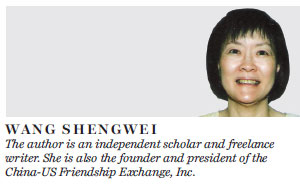It's high time we prepared HK for the age of artificial intelligence
Updated: 2016-04-14 08:12
By Wang Shengwei(HK Edition)
|
|||||||
The game Go originated in China 2,500 years ago. It is now played by 40 million people around the world. It is a board game in which two players use black and white stones to occupy the largest possible territory. Although its rules are simple, Go is vastly more complicated than chess. Indeed, the number of possible moves has been compared to the number of atoms in the universe.
Recently the software AlphaGo has proved for the first time that artificial intelligence (AI) can exceed human intelligence in a Go contest against one of the best human players, Lee Se-dol. AlphaGo is the brainchild of Demis Hassabis of DeepMind, a London-based Google AI lab. In DeepMind, computer engineers create programs based on neural networks to simulate the human brain. AlphaGo is not an ordinary intelligent robot, since it has a self-learning ability and its intelligence can progress.
In Hong Kong, computer scientists are working on AI to make machines think and act in a human and rational way. The city is most focused on medical robotics: The University of Hong Kong and the Chinese University of Hong Kong have conducted advanced studies in this area.
Fanny Law Fan Chiu-fun, chairwoman of the Board of the Hong Kong Science and Technology Parks (HKSTP) Corporation, said that HKSTP will concentrate on AI in healthcare for the elderly, robot development and building a smart city. Hong Kong is a densely populated city with diverse geography, administrative efficiency, a sound legal system, and a new Innovation and Technology Bureau. These are the advantages that can enable the SAR to apply the latest science and technology to build a smart city. Once successfully tested, the experience can be promoted in mainland cities and the "Belt and Road" regions.
Meanwhile, a Hong Kong technology startup, Aidyia, will soon launch a hedge fund in the US managed by AI. The company's co-founder and chief scientist, Ben Goertzel, said the fund would start small but would grow dramatically when it begins trading in US equities in June. Such a development will have a far-reaching influence on Hong Kong as one of the world's leading financial centers. It will make the SAR more competitive as a high-tech hub.
On the mainland, researchers at the Chinese Academy of Sciences expect to launch, with their startup, a deep-learning processor they invented that may take AI to the next level. Another startup, Horizon Robotics, founded by the former head of Baidu's Institute of Deep Learning, claims it is on track to bring chips with built-in AI to market.
In the US, a fresh AI PhD from the world's top universities can get a first work contract earning $2-3 million a year, whereas the IT-focused elite talents starting in Silicon Valley get around $200,000. This is an unprecedented job market situation. The huge salary gap shows fierce competition for scarce talent in the AI industry, and AI's great potential and relevance.
The coming age of human and AI robot symbiosis will have a transformative effect on mankind, as dramatic as its evolution from agriculture to industry to information technology. Hong Kong must prepare for this drastic shift.
As with previous technological revolutions, the mass application of AI may also affect mankind negatively. It may exacerbate the wealth gap and social divisions, as AI will advance the careers and net worth of some while leaving others behind.
Already in the US, the 2016 Economic Report of the President says that robots can improve GDP growth by 10 percent and labor productivity (the rate of output per worker or group of workers per unit of time) growth by 16 percent; but 83 percent of those earning hourly wages of less than $20 will lose their jobs. Kensho founder Daniel Nadler believes that by 2026, 33-50 percent of financial officers will lose their jobs in favor of automation software.
Kim Jin-hyung, a computer and electronic engineering professor in South Korea, has warned that in order to achieve optimum co-existence between human beings and AI robots, the robots should be blocked from harming us and regulated by legislation.
AI will inevitably surpass human beings in more work performance scenarios. But we are assured by Tan Tieniu, an academic at the Chinese Academy of Sciences, who told a group of scientists at the Hong Kong Baptist University recently: "It is still unlikely for AI to be able to think, feel, and have a conscious life in the foreseeable future."
The age of AI has come, although at present it is still being presented as a commercial novelty. The SAR must participate in its further development in order to reap maximum benefits from it.

(HK Edition 04/14/2016 page10)